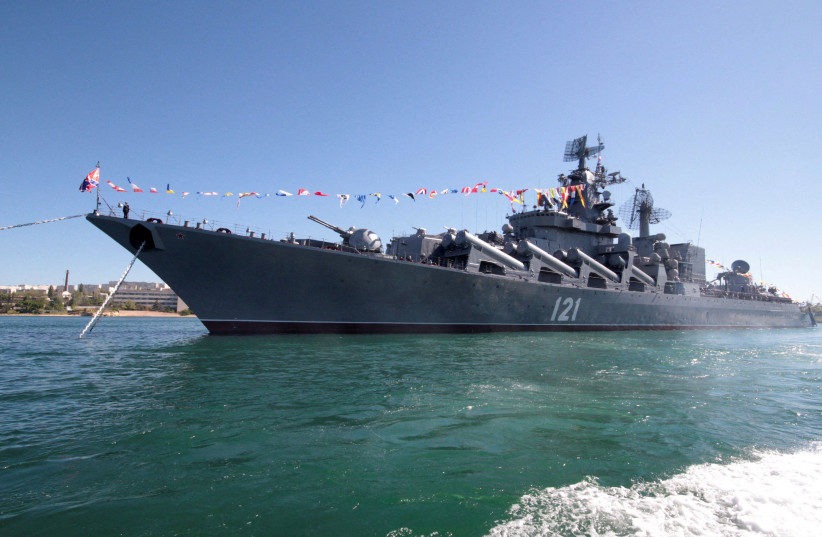The United States provided intelligence to Ukraine on the Russian Black Sea Fleet flagship Moskva just prior to a missile attack on the vessel that resulted in its sinking, CNN reported on Thursday.
US intelligence on the Russian warship
Ukrainian forces called American contacts when they sighted the Moskva in mid-April, and the US confirmed that it was in fact the flagship, and provided further information about its location, CNN said, citing sources familiar with the incident.
The sources told CNN that it is unclear if the US knew that Ukraine would use the intelligence to strike the vessel.
Pentagon on intelligence sharing with Ukraine
The United States provides battlefield intelligence to help Ukrainians defend their country, and we've talked about that quite a bit," Pentagon Press Secretary John F. Kirby said in a Thursday press briefing. "We do not provide intelligence on the location of senior military leaders on the battlefield or participate in the targeting decisions of the Ukrainian military."
Kirby did not greatly elaborate on the type of intelligence that the US did provide to Ukrainian forces, but said "we do provide them useful intelligence, timely intelligence, that allows them to make decisions to better defend themselves against this invasion."

The Pentagon press secretary also noted that Ukrainian intelligence was better in the region that the US.
"This is their country, their territory, and they have capable intelligence collection abilities of their own," said Kirby. "Ukraine combines information that we and other partners provide with the intelligence that they themselves are gathering on the battlefield, and then they make their own decisions and they take their own actions."
The sinking of the <em>Moskva</em>
The Atlant-class guided-missile cruiser Moskva had been hit by two Ukrainian-made Neptune anti-ship cruise missiles on April 13, according to Maksym Marchenko, the Ukrainian governor of the region around the Black Sea port of Odesa. The Ukrainian military later confirmed the strike.
Russia's Defense Ministry claimed that the explosion was caused by a fire that had detonated the cruiser's ammunition stores.
Russian naval forces attempted to tow the ship to harbor, but it sank in stormy weather.
Almost two weeks later, the Russian Defense Ministry admitted to casualties, saying that of the 396 crewmen, "one serviceman was killed, another 27 crew members went missing," AFP reported.
"We can't tell you how many survivors there were or how many sailors fell casualty to the ship sinking," said a US defense official. "We just don't know."
Russia has reportedly launched exploration teams to investigate the potential of salvaging missile tubes and other parts from the wreckage open-source intelligence naval analyst H.I. Hutton reported on April 22.
Loss of <em>Moskva</em> damaging to Russia
The sinking of the Moskva was a severe blow to Russian naval forces.
Russia has been bombarding Ukraine with its naval forces, but since the strike with anti-ship missiles, its warships have been keeping their distance and using long-range ballistic missiles to attack. The Black Sea Fleet is crucial to supporting land operations in the south of the country.
According to retired US Defense Department civil servant Trent Telenko, the Moskva acted as a major air defense asset in the region, carrying multiple surface-to-air missiles for its S-300 air defense system.
The Ukrainian intelligence directorate reported on April 22 that the commander of the Black Sea Fleet Admiral Osipov had been removed from his position and that his deputy was under investigation. The intelligence agency said that the reason for the dismissal was the losses to the navy, including the Moskva.
Ukraine claims to have sunk 10 Russian vessels. Besides the Moskva, the other notable naval loss was the Alligator-class landing support ship Saratov, which was destroyed by a ballistic missile as it was docked in the occupied Ukrainian port of Berdyansk, unloading war materials vital to the Russian campaign.
Russian news agencies said the Moskva was commissioned in 1982 as the Slava.
Symbolic victory for Ukraine
The sinking of the Moskva has been a significant symbol for Ukrainian resistance to Russia, and not just because the ship bears the name of the Russian capital.
The Black Sea Fleet Flagship was one of the two ships that seized Snake Island on February 25, in the now-famous incident in which Ukrainian border guards told Russian naval forces, "Russian warship, f**k you...!" when told to surrender.
Initially, the Ukrainians announced that the 13 servicemen were killed in action, fighting to the end, but it was later revealed that they had survived, and some were later released.
The phrase "Russian warship, f**k you...!" has become a rallying cry for Ukraine and its supporters, even seeing postage stamps created in honor of the Snake Island incident.
The Moskva was recognized two weeks ago as an item of Ukrainian underwater cultural heritage.
